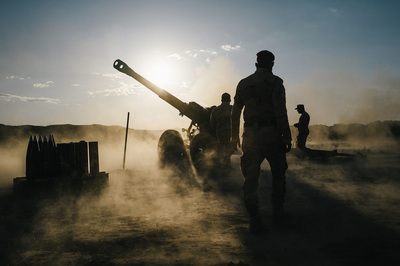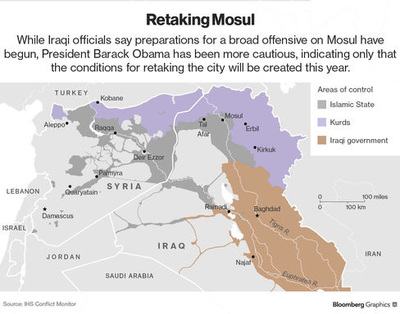The jihadist group, in charge in Mosul for almost two years, warned residents not to pick them up. Those who did were unlikely to be impressed anyway. The administration that’s promising liberation is struggling to exert control a few hundred meters from its seat of power in Baghdad.
The U.S. wants its local allies to deliver a knockout blow to Islamic State, and is sending more troops to Syria and Iraq to steel their resolve. A U.S. Navy SEAL advising Kurdish forces was killed north of Mosul on Tuesday, the third American soldier to die in combat with the militants in Iraq. Vice President Joe Biden, in the Iraqi capital last week, said he’d talked with Prime Minister Haidar al-Abadi about plans to retake Mosul. Biden said he was “very optimistic.”
Many city residents aren’t. The leaflets claimed “that Iraqi security forces are very close to saving us, and that we have to be ready,” a 31-year-old man who lives in Mosul said. “This isn’t the first time they’ve done that. It’s just another attempt to fool us.” Iraqis interviewed from Mosul have not been named to prevent retribution.
The past weekend’s news from Baghdad justified the skepticism. In the latest blow to Abadi’s authority, protesters forced their way into the Green Zone, the secure complex in the heart of the capital that’s housed Iraq’s rulers since the U.S. invasion of 2003. Responding to widespread demonstrations against graft last summer, the prime minister unveiled a reform program, but change has been slow. His efforts to introduce a cabinet of technocrats have been stymied and his government brought to a standstill by a revolt in parliament.
“Abadi is facing the most serious dilemma of his career, there are so many ticking bombs,” said Wathiq al-Hashimi, a Baghdad-based analyst. The political stalemate “will negatively impact the battle for Mosul and elsewhere.”
That means more waiting in Mosul, where conditions deteriorate daily. Residents who spoke by phone said families are burning through savings and selling jewelry to get by. They live in fear of U.S.-led coalition airstrikes as well as the brutality of Islamic State.
And if a push to free the city does eventually get under way, they are concerned it will include Shiite Muslim militias with a history of violence against Sunnis, who now makeup all of Mosul’s population after Christians and Shiites were forced out or killed.
Two Years Lost“The general mood is so pessimistic,” said a former law student. “We’ve been waiting for the Mosul offensive for so long. I’m young, I lost two years of my life here.”
Last year, U.S. and Iraqi officials signaled that a campaign to recapture Mosul would begin this spring. Then Ramadi fell to Islamic State and the focus shifted to taking back the western city, which was achieved in December.
Home to about 2.4 million people before the war, Mosul is the Islamic State’s largest base outside Syria. It was there that the group’s leader, Abu Bakr al-Baghdadi, announced the creation of his caliphate.
Iraqi Defense Ministry spokesman Naseer Nouri said preliminary operations to the south of Mosul have begun, and officials are preparing the ground for a broader offensive. But he said it’s still not clear which military forces would take part, a decision that requires consensus among political leaders.
Obama CautionThere’s little of that in evidence. The squabbles in Baghdad risk sapping the morale of Iraqi forces, which collapsed in the face of Islamic State’s rapid offensive in mid 2014, according to analyst al-Hashimi.
Recapturing Mosul “would be the most difficult battle Iraqi forces have ever faced,” he said. “Without the fighting spirit, the result would be catastrophic.”
U.S. officials have been more cautious than their Iraqi counterparts about the timing of an offensive. President Barack Obama has indicated the conditions for retaking Mosul will be created this year.
If and when the battle comes, it could unleash a new wave of refugees -- adding to the exodus from Syria, which has caused havoc in Europe. Nouri, the Defense Ministry spokesman, said that as many as half of the city’s remaining inhabitants are expected to flee once Islamic State’s defenses start to crumble.
A retired army officer living in Mosul hopes his children will be among them. “Life under Islamic State is unbearable but we’ve adjusted, obeying their rules to protect ourselves and our children,” he said by phone. “I was born here and will die here, but I don’t want my sons to stay. I’ll urge them to flee to Europe as soon as there’s an opportunity to escape this prison.”
Source http://www.bloomberg.com/politics/articles/2016-05-03/never-mind-freeing-mosul-iraq-s-leaders-barely-control-baghdad



 RSS Feed
RSS Feed